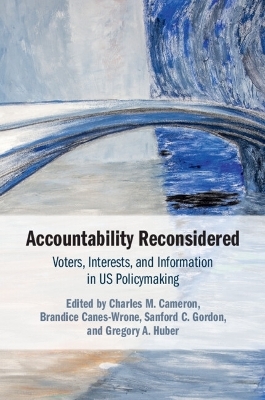
Accountability Reconsidered
Cambridge University Press (Verlag)
978-1-009-16830-4 (ISBN)
The last two decades have witnessed a substantial change in the media environment, growing polarization of the two dominant parties, and increasing inequality of wealth and income. These profound changes necessitate updating our understanding of political accountability. Accountability Reconsidered examines how political accountability functions in the US today given the dramatic changes in voting behavior, media, congressional dynamics, and relations between branches. With particular attention to policymaking, this volume uses original research to analyze micro-foundations of voter behavior, examining its implications for incentives and offering insight into the accountability relationships among voters, interest groups, legislators, and government bureaucracy. Combining contributions from leading experts who write about the political system synoptically with those who focus on specific elements, Accountability Reconsidered brings together distinct perspectives to focus on the effect of the informational environment on government officials, bridging up-to-date knowledge about accountability mechanisms with our overall understanding of political accountability.
Charles M. Cameron is Professor of Politics and Public Affairs at Princeton University. The author or co-author of many articles in leading journals of political science, law, and law and economics, is also the author of the prize-winning Veto Bargaining: Presidents and the Politics of Negative Power (Cambridge, 2000) and co-author with John Kastellec of Making the Supreme Court: The Politics of Appointments 1930-2020 (Oxford, 2023). He has been a National Fellow at the Hoover Institution, a Research Fellow at the Brookings Institution, a visiting fellow and subsequently co-director of Princeton's Center for the Study of Democratic Politics, and taught for many years at Columbia University and Stony Brook University. He is a Fellow of the American Academy of Arts and Science. Brandice Canes-Wrone is Professor of Political Science and Senior Fellow at the Hoover Institution, Stanford University. During the course of her career, Canes-Wrone has published extensively in the areas of political institutions, mass political behavior, and political economy in leading journals of political science and other social sciences. Her book, Who Leads Whom? Presidents, Policy, and the Public (University of Chicago Press, 2006) was awarded the Richard E. Neustadt prize by the American Political Science Association for the best book on the US presidency that year. A Fellow of the American Academy of Arts of and Sciences, she has served on the editorial boards of numerous journals as well as on the boards of the American National Elections Studies, the Institute for Advanced Study in Toulouse, and the Presidents and Executive Politics Section of the American Political Science Association, including as head of that section. Prior to returning to Stanford, where she obtained her Ph.D., Canes-Wrone was a faculty member of MIT, Northwestern, and Princeton. Sanford C. Gordon is Professor in and Chair of the Wilf Family Department of Politics at New York University and an Associated Professor (by courtesy) in the New York University School of Law. His work has appeared in The American Political Science Review, the American Journal of Political Science, The Journal of Politics, the Proceedings of the National Academy of Sciences, among many other leading journals. He is also a frequent contributor to public discussion of politics in venues such as The Washington Post. In 2019 The Proceedings of the National Academy of Sciences cited his work as making a large impact on public understanding of science and scientific inquiry. He has been a Visiting Fellow at Princeton's Center for the Study of Democratic Politics and is the recipient of numerous grants from the National Science Foundation and foundations.
1. Introduction CHARLES CAMERON, BRANDICE CANES-WRONE, SANFORD C. GORDON and GREGORY A. HUBER; Part I. Candidate Evaluation and Selection: 2. The Importance of Issue Representation in a Polarized Congress JOSHUA D. CLINTON, MICHAEL W. SANCES and MARY CATHERINE SULLIVAN; 3. Can Citizens Assess Policies Based on Programs' Costs and Benefits? The Role of Yardsticks and Contextual Information in Democratic Accountability ERIC M. PATASHNIK, PATRICK TUCKER and ALAN S. GERBER; 4. Logic with Polarized Parties, Changing Media, and Motivated Reasoners PATRICK J. EGAN and MARKUS PRIOR; 5. Groups, Parties, and Policy Demands in House Nominations KATHLEEN BAWN, KNOX BROWN, ANGELA X. OCAMPO, SHAWN PATTERSON, JR., JOHN L. RAY and JOHN ZALLER; Part II. The Media and the Informational Environment: 6. Local Newspapers and Ideological Accountability in US House Elections BRANDICE CANES-WRONE and MICHAEL R. KISTNER; 7. Inequality, or Invisibility and Inaccuracy? How Local Newspapers Cover the Occupational Backgrounds of Congressional Incumbents and Challengers NICHOLAS CARNES; 8. Congressional Accountability in the Contemporary Media Environment: Arguments, Data, and Methods GREGORY A. HUBER and PATRICK TUCKER; Part III. Policymaking, Information Provision, and Accountability: 9. Coalition Leadership in the Polarized Congress FRANCES E. LEE; 10. Fire Alarms and Democratic Accountability CHARLES M. CAMERON and SANFORD C. GORDON; 11. Achieving Accountability: Aligning Institutions and Behavior JOHN W. PATTY; Part IV. Outside the Public Eye? Private Interests and Policymaking: 12. Legislator Advocacy on Behalf of Constituents and Corporate Donors: A Case Study of the Federal Energy Regulatory Commission ELEANOR NEFF POWELL, DEVIN JUDGE-LORD, and JUSTIN GRIMMER; 13. Organized Interests, Policymaking, and Congressional Accountability LEE DRUTMAN; 14. Administrative Politics with Clear Stakes and Venues: Strategic Commenting upon Federal Reserve Debit Card Regulations DANIEL CARPENTER and BRIAN LIBGOBer; 15. Conclusion CHARLES M. CAMERON, BRANDICE CANES-WRONE, SANFORD C. GORDON and GREGORY HUBER.
| Erscheinungsdatum | 10.08.2024 |
|---|---|
| Zusatzinfo | Worked examples or Exercises |
| Verlagsort | Cambridge |
| Sprache | englisch |
| Maße | 152 x 229 mm |
| Gewicht | 640 g |
| Themenwelt | Sozialwissenschaften ► Politik / Verwaltung |
| Wirtschaft ► Volkswirtschaftslehre ► Wirtschaftspolitik | |
| ISBN-10 | 1-009-16830-4 / 1009168304 |
| ISBN-13 | 978-1-009-16830-4 / 9781009168304 |
| Zustand | Neuware |
| Haben Sie eine Frage zum Produkt? |
aus dem Bereich


